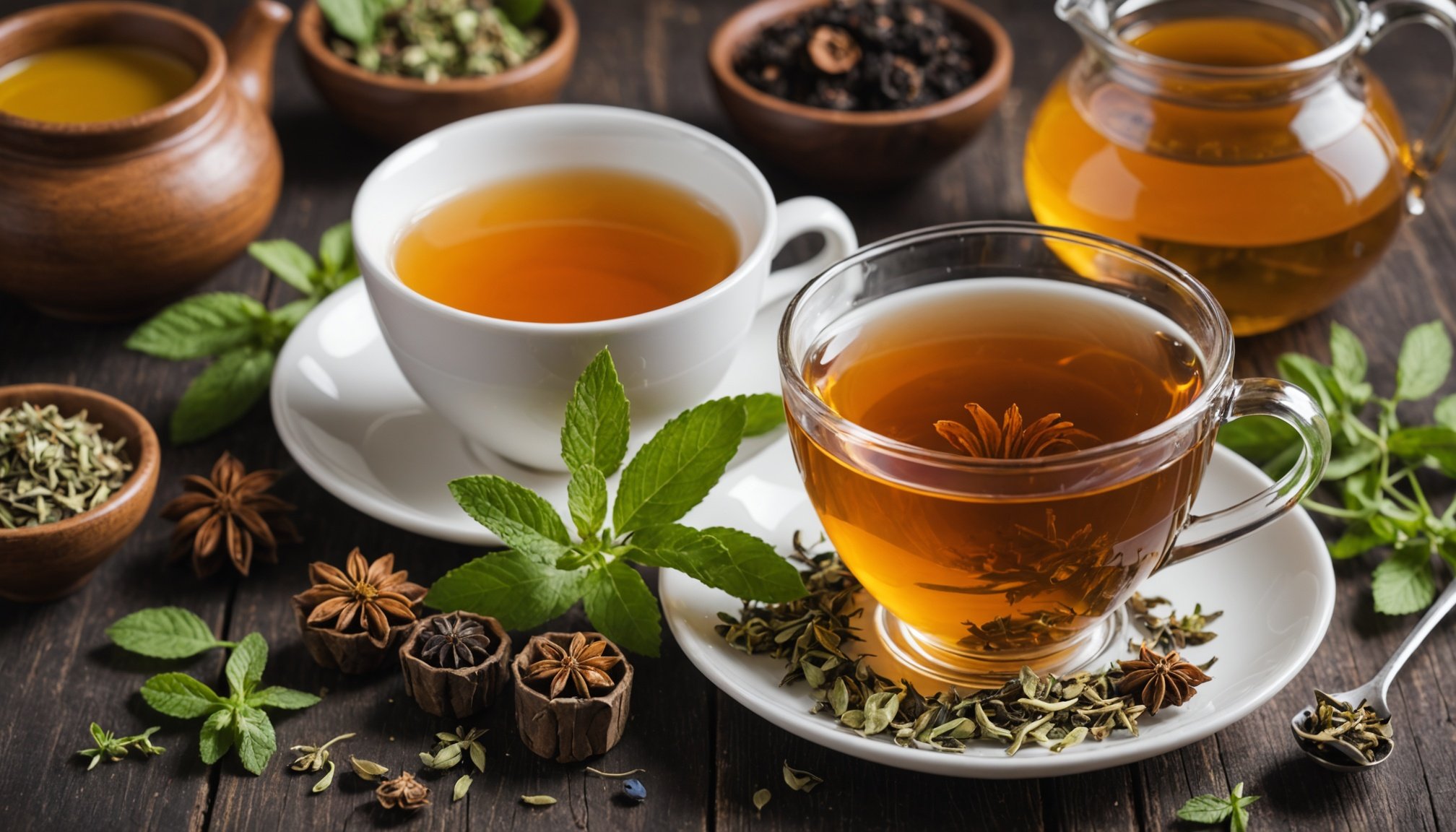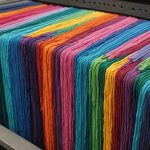Introduction to Herbal Teas
Herbal teas, composed of dried herbs, flowers, fruits, or spices, have roots dating back centuries. They are not only cherished for their flavours but are integral to holistic beauty solutions and natural remedies. Historically, various cultures have infused these plants, utilizing their inherent properties to address health and beauty concerns.
In recent times, herbal teas have gained popularity within holistic beauty solutions. These naturally potent concoctions draw attention for their ability to enhance both skin and hair health. Herbal teas deliver essential nutrients while simultaneously hydrating the body, playing a significant role in beauty regimens.
Also to read : Elevate your summer wardrobe: innovative approaches to incorporate sheer fabrics with style
The infusion process enables the transfer of vitamins, minerals, and antioxidants from the herbal teas into consumable form, making them a practical choice for those seeking natural remedies. For skin, certain teas can promote a more radiant complexion, while for hair, they support strength and shine. Integrating herbal teas as a staple in one’s beauty routine can offer an easy and enjoyable path to enhancing natural beauty.
By understanding which herbal teas work best for specific concerns, one can tailor their beauty approach to personal needs. This ancient practice continues to evolve, offering modern audiences invaluable beauty solutions.
In the same genre : Elevate your style: fashionable tips for rocking thigh-high boots with confidence
Benefits of Herbal Teas for Skin
Herbal teas offer a wealth of benefits for skin health owing to their rich nutrient content. Key nutrients found in herbal teas, such as antioxidants, polyphenols, and flavonoids, play an essential role in promoting glowing skin. These compounds help protect the skin from oxidative stress, reducing signs of aging and improving overall skin texture.
Specific herbal teas address various skin conditions effectively. For instance, chamomile tea has anti-inflammatory properties that can soothe irritated skin, while rooibos tea contains zinc, known for alleviating acne symptoms. By targeting particular needs, individuals can enhance their skin health through these natural remedies.
Hydration, crucial for maintaining a vibrant skin appearance, is another significant advantage of consuming herbal teas. They promote moisture retention, preventing dryness and flakiness. As the body stays hydrated, the skin reflects this through a healthy, radiant glow.
Drinking herbal teas as part of a daily routine can provide holistic beauty solutions by nourishing the skin from within. The gentle brewing process ensures the preservation of critical nutrients, making herbal teas a practical choice for those seeking natural, effective skincare. Integrating these beverages into one’s lifestyle is a subtle yet powerful way to achieve a luminous complexion.
Benefits of Herbal Teas for Hair
Herbal teas for hair offer significant boosts to maintaining lustrous hair, given their rich content of essential vitamins and minerals. These nutrients can fortify the hair, enhancing strength and overall health. Vitamins like A, C, E, and significant minerals such as zinc and selenium contribute to reducing hair breakage and promoting healthy growth.
Impact on Scalp Health and Hair Growth:
Herbal teas provide nourishment not only to the hair strands but also invigorate scalp health. An optimally nourished scalp is essential for robust hair growth, as it creates a conducive environment for hair follicles to thrive. For example, rosemary tea is particularly notable for its ability to improve blood circulation to the scalp, which in turn can accelerate growth.
Specific Herbal Teas for Shine and Softness:
Certain herbal teas enhance hair shine and softness, creating an appealing appearance. For instance, hibiscus tea can profoundly condition the hair, giving it a glossy sheen. Similarly, horsetail tea contains silica, fostering silky tresses. By integrating these teas into your routine, you naturally nurture your hair, encapsulating a holistic approach to beauty. Embrace these natural remedies and unlock vibrant, healthy hair effortlessly.
Popular Herbal Teas and Their Properties
Delving into the world of popular herbal teas unveils various options, each with unique herbal tea properties. Different types of herbal teas cater to skin and hair care needs, enriching beauty routines.
Chamomile Tea
Chamomile tea stands out for its gentle properties, soothing both skin and hair. It aids in reducing skin inflammation and encourages shine in hair. Making it is easy: steep chamomile flowers in hot water for 5-10 minutes. Consume when warm to enjoy its relaxing effects.
Green Tea
Renowned for its exceptional antioxidant properties, green tea combats free radicals, supporting radiant skin and strong hair. It is beneficial to drink green tea in the morning or early afternoon, as its caffeine content can affect sleep. Brewing it involves steeping tea leaves in hot water (not boiling) for 2-3 minutes to maintain delicate flavours.
Nettle Tea
With a rich array of vitamins and minerals, nettle tea is a powerhouse for beauty care. It fortifies hair and revitalises the skin. To utilise for beauty benefits, brew dried nettle leaves and implement regular consumption. Incorporating nettle tea into skincare routines can yield enhanced results over time, showcasing noticeable improvements.
Recipes for Herbal Tea Infusions
Creating personalized herbal tea recipes can be a delightful way to cater to specific beauty needs, particularly for skin and hair. Begin with a basic herbal tea recipe by selecting high-quality dried herbs, fruits, or flowers. Consider pairing chamomile with lavender for a calming evening blend, or green tea with lemon peel for a refreshing morning pick-me-up.
Step-by-Step Instructions:
- Measure about one tablespoon of your chosen herbal tea blend per cup of water.
- Use freshly boiled water and pour over the herbs for an optimal infusion.
- Cover the container to trap essential oils and steep for 5-10 minutes.
- Strain the tea into a cup and enjoy. For hair rinses, simply allow the tea to cool before use.
To enhance effects, mix herbs with complementary properties. For glowing skin, blend hibiscus and rosehip to infuse rich antioxidants. For hair strength, combine nettle and horsetail to leverage their silica content.
Tips:
- Experiment with proportions to suit taste preferences.
- Use a tea infuser or bag for easy cleanup.
- Store leftover tea in the refrigerator for up to 48 hours.
Potential Side Effects of Herbal Teas
While herbal teas are celebrated for their natural remedies and holistic beauty solutions, it’s crucial to acknowledge possible herbal tea side effects. Some individuals may experience mild reactions like stomach discomfort or headaches due to specific ingredients. It’s vital to pay attention to the body’s signals and respond accordingly.
Allergic reactions are another aspect to consider, particularly if you have known plant allergies. Herbal teas often contain multiple herbs, increasing the potential for unexpected allergic responses. Symptoms can include rashes or swelling, urging caution for those with sensitivities.
Moreover, certain herbs can interact with medications, impacting their effectiveness or leading to adverse effects. Consultation with healthcare professionals is advised before integrating herbal teas into routines, especially for individuals with existing medical conditions.
Recommendations for safe consumption include gradually introducing new teas and monitoring reactions. Opting for teas from reputable sources ensures better quality and safety. Pregnant and breastfeeding women should be especially cautious, as some herbs may not be suitable during this period.
By prioritizing safe practices, you can enjoy the benefits of herbal teas while minimizing potential risks, paving the way for a healthier and balanced beauty regimen.
Preparation Methods
Understanding the best tea preparation methods is essential for harnessing the full advantages of herbal teas. Each method can affect the potency and flavour, impacting the efficacy of these natural remedies.
Brewing Techniques
Various brewing techniques exist, but key factors include the steeping time and water temperature. Most herbal teas benefit from steeping in freshly boiled water for 5-10 minutes. Adjusting this time can enhance or reduce flavour intensity and nutrient extraction.
Steeping Time and Temperature
It is crucial to follow the recommended steep time for each type of tea to prevent bitterness or loss of benefits. For example, delicate teas like chamomile require a gentler approach compared to robust varieties such as nettle.
Storage Tips
Proper storage is also paramount for maintaining tea freshness and potency. Store herbal tea in a cool, dry place away from direct sunlight. Consider using airtight containers to protect from moisture and odours, preserving their holistic beauty solutions properties over time. By executing optimal preparation and storage, you ensure the best experience and results from your herbal tea journey.
Testimonials and Expert Insights
Exploring herbal tea testimonials gives valuable insights from individuals who have integrated these beverages into their routines for enhanced beauty. Many users report noticeable improvements in their skin and hair health. For instance, increased hydration is commonly linked to a glowing complexion and lustrous hair.
Experts often highlight the potential of herbal teas in beauty regimes. Herbalists and skincare specialists frequently recommend teas like chamomile and nettle for their soothing and fortifying properties. Chamomile’s gentle nature helps reduce inflammation, while nettle contributes to strengthening hair.
Engaging with expert opinions can provide clarity on selecting the most effective teas for individual needs. They suggest examining specific herbal tea properties to address unique beauty concerns, ensuring results are both visible and beneficial.
For further exploration, readers can delve into detailed guides offering advice on how to incorporate herbal teas as natural remedies. Trusted forums are also a great resource for diverse experiences and tips on sourcing high-quality products.
By tapping into the shared wisdom within testimonials and expert views, individuals can make informed decisions and successfully apply holistic beauty solutions.
Additional Resources and Recommendations
When exploring herbal teas as part of your beauty regimen, accessing quality herbal tea resources is invaluable. Diving into comprehensive guides can offer a profound understanding of natural remedies and holistic beauty solutions. These guides often detail preparation techniques and ingredient benefits, making them essential reading for enthusiasts eager to maximize their tea experience.
For those keen on purchasing tea, selecting tea products from reputable vendors ensures authenticity and potency. High-quality teas preserve the essential nutrients vital for achieving the desired beauty results. When shopping, focus on organic and sustainably sourced options to support eco-friendly practices.
For deeper insights, consider delving into further reading materials that examine the historical use and modern applications of herbal teas. Books and articles from experienced herbalists provide a comprehensive view, shedding light on the scientific and traditional aspects of these potent brews.
Engaging in forums is another way to enrich your knowledge. These platforms allow for sharing personal experiences, tips, and advice on sourcing and preparing herbal teas. By leveraging these resources, you’ll be well-equipped to incorporate herbal tea into your beauty and wellness routine effectively.











